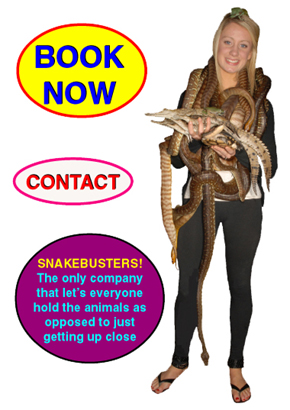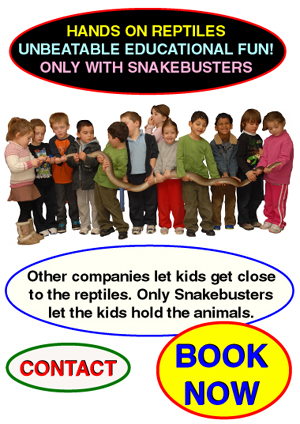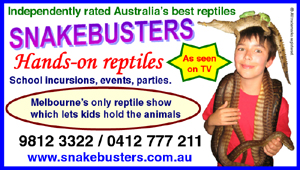 Why did everyone else say that Snakebusters® are Australia's best reptiles?
Why did everyone else say that Snakebusters® are Australia's best reptiles?
It is almost unheard
of for competing traders in an industry to gang up on the market leader and go
to court claiming that the market leader is better than them.
It’s less uncommon
for traders to seek government help in “levelling the playing field” against a
business rival who has an unassailable competitive advantage, but it has
happened before.
This is what happened
in the lead up to and during VCAT proceedings in Victoria in 2008 involving
Snakebusters.
Less experienced
wildlife demonstrators all complained that they were struggling to get clients
because Snakebusters were so much better than them.
The proceedings were
about getting the Victorian Government to impose regulations on Snakebusters in
order to lower their standards to allow others to compete against Snakebusters.
In essence the
Victorian government wanted to restrict Snakebusters and their use of
devenomized snakes in hands on reptile shows.
At the time,
Snakebusters were handing out devenomized Jaffa Snakes to people to give them a
“once-in-lifetime” experience of handling mega-deadly snakes risk free.
The devenomized Jaffa
Snakes were a Snakebusters exclusive, that no one else anywhere in the world
could match.
The Snakebusters argument that others should improve their
standards to match Snakebusters was rejected by the government on the basis
that it was impossible for them to do so.
Here’s the detail.
In order to “level”
the playing field, a few years earlier, the Victorian Wildlife Department (DSE)
had outlawed venomoid surgery (devenomizing) on snakes. While the target had been Snakebusters and
Raymond Hoser (the only people with them), the rule change actually hampered
everyone else.
You see Snakebusters
already had lots of venomoid snakes and because laws can’t be made
retrospective, Snakebusters continued with business as usual.
However no other
wildlife demonstrators were able to use the methods first used by Hoser to get
their own devenomized snakes.
This meant that
Snakebusters had what the DSE called an “unfair” competitive advantage.
Snakebusters could
cart deadly snakes to shopping malls in total safety while less expereinced
rivals could only dream of it.
And so the VCAT
matter was about redressing this unbalance.
Snakebusters argued
that venomoids were good and that with Raymond Hoser as the expert on such
things, he should be listened to.
Hoser called for the
banning on the procedure to be lifted and also for other demonstrators to be
prosecuted when they put public safety at risk using snakes in public that were
dangerous and not venomoid.
DSE and the others
demonized venomoids and said the banning of the procedure was good.
They went further and
demonized all forms of hands on with reptiles, mainly because almost all the
expert witnesses who made statements for Snakebusters supported these things
and DSE’s lawyers sought to undermine Hoser’s recognised and unrivalled expertise and
credibility.
On the basis of these
unanimous sworn legal statements from everyone to the effect that Snakebusters were “Australia’s
best reptiles”, because of both the venomoid snakes, as well has Hoser's unmatched expertise, which couldn't be legislated against, Raymond Hoser then applied for the trademark, “Australia’s best reptiles”.
In the first
instance, the claim for the trademark was rejected. Hoser was asked to prove he
and his company Snakebusters were in fact “the best”.
This so called “adverse
report” would normally be the end of the road for any attempt to get such a
trademark.
A “words only”
trademark, using a term such as “best” is almost unheard of, because it’d be
almost impossible to be able to get statements from competitors in an industry
lining up to claim that one particular company (applying for such a trademark) was
so much better than them and should get legally enforceable exclusive rights to claim they are the
best.
However armed with
the VCAT case statements and a raft of other evidence, Raymond Hoser was able
to show the trademarks office that yes, everyone who mattered in the reptile
industry and who knew things, all said Hoser’s company was the best in all
things reptiles.
Hence Hoser got the
registered trademark, Australia’s best reptiles.
The trademark’s "claim"
was “wide” and included pretty much everything, with Snakebusters successfully proving they were the best in Australia for reptile shows, snake shows, wildlife shows, snake catching, snake handling, venomous snake handling courses, school wildlife incursions, kids reptile parties, reptile displays at major events, publishing accurate information on reptiles and more.
Because all the other
companies, DSE and VCAT all demonized “hands on reptiles” as practiced by
Snakebusters, as well as our educational kids parties with reptiles. (The VCAT judge, Anne Coghlan claimed “hands on reptiles” by
Snakebusters and our kids reptile education parties were nothing more than a circus, a claim widely repeated by DSE and other
demonstrators), Hoser’s application for the hands on reptiles trademark (first
rejected), eventually made it through the adverse report process, as did a series of "Reptile Party" and "Reptile Parties" words trademarks.
You see another
reason to reject a trademark is if other traders in an industry would be likely
to use such words or trademarks.
The VCAT proceedings
showed that not only were all the other wildlife demonstrators in Australia
against hands on reptiles, and taking reptiles to kids parties, but that their opposition was vehement. Contrary to the opposition to "hands on" wildlife shows was teachers from the best schools, most other educators and leading wildlife scientists who unanimously endorsed Snakebusters and their education of children as being "the best", as well as statements from over 10,000 other people in written "testimonials" and the like which eventually helped push the trademark registration over the line.
Now that Snakebusters
has registered both trademarks, "Hands on reptiles" and "Australia’s best reptiles"
as well as similar relevant phrases such as "Reptile party" and "Reptile Parties", and been demonized by less experienced
rivals for these activities, there is no way Snakebusters would now allow them to
bootleg the trademarks a few years later for the purpose of stealing
Snakebusters clients or potential clients who seek to have hands on reptiles shows
as done by Snakebusters.
This is particularly
so as “hands-on” by Snakebusters means people can "hold the animals" (another of many alternative phrases we own the registered trademark for), while “hands on” as described by the imitators at best may mean, merely touching a reptile for a few seconds.
The same applies in
terms of people who purchase a $70 business name one day and then erect a
website claiming to be “best” the next.
Snakebusters won’t
allow that either and with the registered trademarks, Snakebusters now has the
legally enforceable powers to stop bootleggers in their tracks.
For the benefit of school
teachers, parents and others, it’s important that they know who is actually the
best in Australia’s reptile education business and who does proper hands on
with reptiles.
That’s why
Snakebusters will remain protective of our trademarks and other intellectual
property.
© 2015, Snakebusters®, independently rated as Australia's best reptiles®. All Rights Reserved.
Snakebusters®, Snake Man®, Reptile Party®, Reptile Parties® and trading phrases like, Hold the animals®, Handle the animals®, Hands on reptiles®, Australia's best reptiles®, includes one of many variants that are registered trademarks, for which unauthorised use is forbidden. This is including for items underneath:

